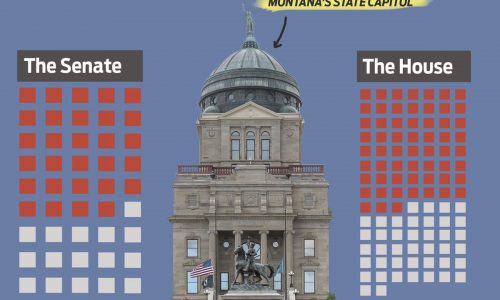In the battle for control of Montana’s next Legislature, the most important race may be the one for governor.
Republicans have controlled the Legislature since 2007. In 2015, they had 59 representatives and 29 senators — making up slightly over half of each chamber. The outcome of the governor’s race will surely influence the type of laws legislators enact this winter.
Last session, Democratic Gov. Steve Bullock had help from moderate Republicans and minority Democrats, who joined forces to pass a compromise budget, expand health care coverage to more low-income Montanans and uphold Bullock’s record number of vetoes.
However, the coalition broke down when lawmakers failed to compromise on spending for infrastructure, such as building and maintenance projects statewide.
Jeremy Johnson, a political science professor at Helena’s Carroll College, said Montanans saw “an almost three-party system” last session. He expects the split could be about the same in January, with moderates gaining a couple House seats.
That makes the race between Bullock and Republican businessman Greg Gianforte all the more important.
“Gianforte could accomplish more with a Republican Legislature than a Democrat could with a Republican Legislature,” Johnson said.
Issues on the ground
Against that backdrop, candidates in 125 legislative districts are debating issues, ranging from public works projects to schools and the best use of public lands, which offer recreation, grazing and natural resources like timber, coal, oil and natural gas.
In Yellowstone County’s Senate District 26 race, Republican Donald Roberts wants Montanans to have more say in how federal lands are managed for the economy’s sake.
“I think some of the land policies need to be discussed between the state and the federal government,” said Roberts, who served four terms in the House. “I think we need to have a better-coordinated effort between private business and the use of our natural resources.”
His opponent, Rep. Margie MacDonald, D-Billings, said she’s wary of the state actually taking ownership of federal lands.
“It would be very costly, and the state of Montana would have to put most of our favorite recreational forests … on the auction block,” she said.
Instead, MacDonald, an organizer for the Western Organization of Resource Councils, sees reinvesting in park management and maintenance as a potential revenue boost.
“I think we’re increasingly seeing that recreation is one of our leading economic sectors,” MacDonald said. “We need to step up in terms of our management of this resource.”
Rebuilding Montana
Investing in roads, bridges and other public works is a priority too. MacDonald notes that Infrastructure bills have failed in every session she’s served, except her first, in 2009.
That’s also a concern for Garrett Lankford, a former lobbyist for Montana university students and the Democratic candidate in Great Falls’ House District 25.
“We are talking about roads and sewers and basic necessities that are kind of run down,” Lankford said. “If we don’t fix them now we’re going to face some terrible, terrible, terrible disasters.”
Lankford’s opponent, Republican Jeremy Trebas, said ability of the Legislature to pay for such work is largely dependent on the budget surplus, which has decreased significantly since the last session.
“I think the biggest issue is probably going to be our budget,” said Trebas, an accountant. “Are we going to be able to sustain all the programs we have now currently?”
But Lankford sees the budgetary shortfall as an opportunity.
“When the budget’s so tight you really emphasize the things you believe in,” Lankford said.
Lankford and Trebas differ somewhat over priorities for school spending. Lankford supports universal pre-school and increases in school funding. Trebas wants funding specifically for public school arts and music programs.
Bison and wolves
Meanwhile, candidates in Senate District 47, which stretches from Missoula to Flathead Lake, are talking about agriculture and wildlife.
Rep. Dan Salomon, the Republican candidate and a dairy farmer, fears further efforts to restore bison and the danger wolves pose to livestock.
“Of course, they want to take buffalo and run them as wildlife instead of livestock in central Montana,” Salomon said. “How that would affect the livestock industry is a huge concern.”
His opponent, Tom France, believes that agriculture may take a backseat this session, as he “doesn’t have the sense it’s a big issue.”
“I do think that the state’s present program for wolf management seems to be fairly well-accepted and supported,” said France, who works for the National Wildlife Federation.
Voters’ concerns
The candidates say constituents and interest groups aren’t shy about suggesting ideas for bills.
Salomon mentioned concerns about puppy mills — backyard dog breeders that occasionally make headlines for inhumane conditions.
That’s an issue MacDonald is familiar with too. She’s even sponsored legislation “so that Montana does not become a haven” for abusive dog breeding.
“It’s very costly, especially to local governments, when they have one of the facilities in their community and have to go in and clean it up,” MacDonald said.
As he makes the rounds in his district, France said he hears complaints about the presidential race.
“I think the most prevalent thing I’ve heard on the doors is a discouragement with the presidential race,” France said. Others, he added, wish “one or both candidates could garner real support to lead the country.”
One common theme, he said, is the need for government that works.
“I think people look generally to the Legislature to be serious about good government,” France said. “People want their Legislature to be solution-oriented.”
Those concerns, local and national, big or small, make legislative races all the more notable.
“No issue is like small or miniscule by any means,” Lankford said.

